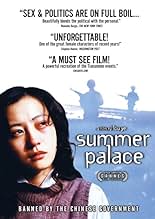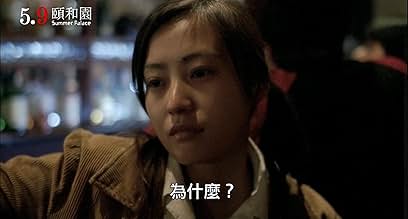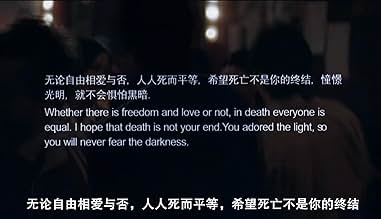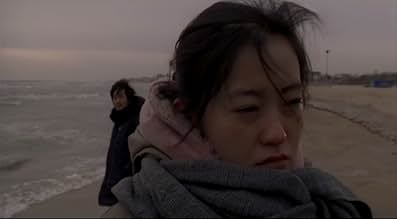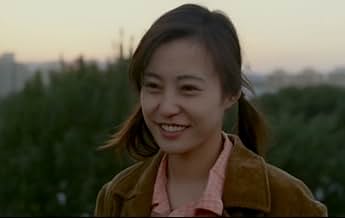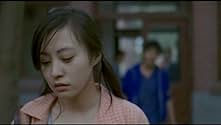NOTE IMDb
7,2/10
4,8 k
MA NOTE
Ajouter une intrigue dans votre langueYu Hong leaves her home village and starts university in Beijing, where she develops a consuming and compulsive relationship with another student. The student riots from 1989 then ensue and ... Tout lireYu Hong leaves her home village and starts university in Beijing, where she develops a consuming and compulsive relationship with another student. The student riots from 1989 then ensue and take a toll on their lives.Yu Hong leaves her home village and starts university in Beijing, where she develops a consuming and compulsive relationship with another student. The student riots from 1989 then ensue and take a toll on their lives.
- Réalisation
- Scénario
- Casting principal
- Récompenses
- 1 nomination au total
Avis à la une
Whether there is freedom and love or not, in death everyone is equal. I hope that death is not your end. You adored the light, so you will never fear the darkness.
Recently, I had a sudden urge to watch the banned film "The Flowers of War" by director Lou Ye. After watching it, I still couldn't figure out why it was called that, as it has nothing to do with the Summer Palace. During the search for resources, I found both a 134-minute and a 140-minute version, and ultimately chose the latter. My mental journey during the viewing was as follows: What the heck is this? It's all about love and sex. So Lou Ye is into this? He likes to use sex to express the confusion and aimlessness of young people? I always consider myself a down-to-earth person, and I admit that I really couldn't understand what the director was trying to convey. So I will look for other materials to help me understand. I feel that Lou Ye wanted to capture the fate of individuals in the historical tide. I can sense the director's ambition, but it's really hard to understand. Without professional explanations, I admit that I really couldn't get it! Why can't the director just tell a clear story? Not everyone can understand metaphors, of course, that's the charm of art films. It's endlessly intriguing and captivating, making one want to explore further. This is the allure of the unknown, and curiosity drives us to meet. Alright, Lou Ye, you win!
Recently, I had a sudden urge to watch the banned film "The Flowers of War" by director Lou Ye. After watching it, I still couldn't figure out why it was called that, as it has nothing to do with the Summer Palace. During the search for resources, I found both a 134-minute and a 140-minute version, and ultimately chose the latter. My mental journey during the viewing was as follows: What the heck is this? It's all about love and sex. So Lou Ye is into this? He likes to use sex to express the confusion and aimlessness of young people? I always consider myself a down-to-earth person, and I admit that I really couldn't understand what the director was trying to convey. So I will look for other materials to help me understand. I feel that Lou Ye wanted to capture the fate of individuals in the historical tide. I can sense the director's ambition, but it's really hard to understand. Without professional explanations, I admit that I really couldn't get it! Why can't the director just tell a clear story? Not everyone can understand metaphors, of course, that's the charm of art films. It's endlessly intriguing and captivating, making one want to explore further. This is the allure of the unknown, and curiosity drives us to meet. Alright, Lou Ye, you win!
This film is about several Chinese people, about how they grow up and how time changes them. It is focused on one couple, the very intense passion that they feel for each other and the paths that life shows them in relation of what they feel in each step of their lives...
This movie is centered in love. More exactly, it is centered in the romantic view of life, which is destined to collide with the fact of growing up, because the characters in the film just can't manage to keep their passionate feelings while they start living other things after leaving university. It is as if life and circumstances pushes them to leave behind their memories, the anchor that seems to keep the characters living and knowing that they are someone. I think it is interesting how this is managed as the film goes by, because I recognized this feeling in myself and among my friends: about how, by leaving school, you have the feeling to be adrift in the universe of life.
Also, the passion that the characters feel becomes sedated by the tedium of their lives after school. I think the director tries to communicate that feeling: after university, the characters start to get bored with their lives, compared with what they lived in school. It is sad to look how the woman character struggles to keep that feeling alive, but always feeling depressed because she can't grasp that passion that just goes away. They travel, they meet other people, they get jobs, but simply it's not the same. This is also related to the student's protests in China, all the feelings and expectations they generate, and the disillusion they found when they have to confront the real world.
Finally, I think what the film communicates, is that every emotion, love, feeling or whatsoever, is seized by time. This is something that the characters just don't get and the reason of why they suffer: they can't accept that they are different from the ones that were young and passionate. Even in long marriages, couples have to reinvent themselves to keep together each other, or simply they fall in the arms of custom. This last thing is what the characters refuse to do, always trying to keep their feelings alive. But that's also the reason of why they suffer, especially the woman character: they live attached to their memories and they leave part of their identity in the past. I think that a phrase that is showed in the french movie "Irreversible" could fit perfectly on this one: TIME DESTROYS EVERYTHING. But in this film, this phrase applies in a more subtle way, in something that involves people's identities.
I liked the movie. It was one of those which you can't get out of your head for the rest of the day. The acting is good and the music is great. If there is something to criticize, is that the film is a little bit too long for what it express, specially at the second part of the film. I found other criticism unfounded: sex is an important part of the film, since it express passion, and it's definitely NOT a soap opera, because it doesn't have a happy ending and it has a message that you have to discover by thinking and feeling the film.
I recommend this one.
This movie is centered in love. More exactly, it is centered in the romantic view of life, which is destined to collide with the fact of growing up, because the characters in the film just can't manage to keep their passionate feelings while they start living other things after leaving university. It is as if life and circumstances pushes them to leave behind their memories, the anchor that seems to keep the characters living and knowing that they are someone. I think it is interesting how this is managed as the film goes by, because I recognized this feeling in myself and among my friends: about how, by leaving school, you have the feeling to be adrift in the universe of life.
Also, the passion that the characters feel becomes sedated by the tedium of their lives after school. I think the director tries to communicate that feeling: after university, the characters start to get bored with their lives, compared with what they lived in school. It is sad to look how the woman character struggles to keep that feeling alive, but always feeling depressed because she can't grasp that passion that just goes away. They travel, they meet other people, they get jobs, but simply it's not the same. This is also related to the student's protests in China, all the feelings and expectations they generate, and the disillusion they found when they have to confront the real world.
Finally, I think what the film communicates, is that every emotion, love, feeling or whatsoever, is seized by time. This is something that the characters just don't get and the reason of why they suffer: they can't accept that they are different from the ones that were young and passionate. Even in long marriages, couples have to reinvent themselves to keep together each other, or simply they fall in the arms of custom. This last thing is what the characters refuse to do, always trying to keep their feelings alive. But that's also the reason of why they suffer, especially the woman character: they live attached to their memories and they leave part of their identity in the past. I think that a phrase that is showed in the french movie "Irreversible" could fit perfectly on this one: TIME DESTROYS EVERYTHING. But in this film, this phrase applies in a more subtle way, in something that involves people's identities.
I liked the movie. It was one of those which you can't get out of your head for the rest of the day. The acting is good and the music is great. If there is something to criticize, is that the film is a little bit too long for what it express, specially at the second part of the film. I found other criticism unfounded: sex is an important part of the film, since it express passion, and it's definitely NOT a soap opera, because it doesn't have a happy ending and it has a message that you have to discover by thinking and feeling the film.
I recommend this one.
This film caught me from the moment it started at my screen. we see a young girl encountering her first experiences with love and sex.set at the decor of the huge changes China is undergoing in the mid-eighties.She is excepted at university and meets a handsome guy she's so overpowering in love with , it's scary...wow , the acting , directing ,editing, photography...is breathtaking..the story sometimes heartbreaking..trough sidesteps we are witnessing the student uproar at tianamen square etc.the 2 main characters loose sight of each other and we follow moments of their separate lives.. A breathtaking lovestory about love so strong , it hurts. definitely worth watching.
This Cannes Festival 2006 entry by the director of Suzhou River and Purple Butterfly (enjoyng very limited US theatrical release in early 2008) is more unwieldy but also bolder and more authentic than its predecessors, while still as moony and emotional and indebted to Wong Kar-wai and the French New Wave. You could compare this to Dr. Zhivago or Splendor in the Grass but despite its intense period flavor at times--the cluttered dorm rooms stay with you as do the rushing demonstrators, and the progression from bikes to nice cars and email is subtle but unmistakable--it hasn't got the structure or plot of the usual generation-spanning films; it's a hymn to love-longing posing as a contemporary historical epic. As such, it's poised for failure and doomed to be dismissed by many. But it's really great fun, a fluent, flowing, committed film with more to think about and respond to than much better-made and more tightly-edited work. And after it was shown at Cannes without official permission from home, it got Lou banned from film-making in China for five years.
Full of intense realistic sex and frontal nudity that would be daring anywhere not to mention China , Summer Palace focuses on a passionate young woman who comes from the country to study at Beijing University just before the Tiananmen Square demonstrations and massacre of 1988, and though it brilliantly evokes the excitement, freedom, and experimentation of that period for what is essentially the director's own generation (Purple Butterfly dealt with the 1930's), and it gives a sense of the chaos and horror that follows--this extended, breathtaking Tiananmen-period sequence is a tour de force--the politics are peripheral to protagonist Yu Hong (Hao Lei) and the intense love addiction she shares with Zhu Wei (Guo Xiaodong). But when the repression comes, Xiao Jun (Cui Lin), Yu Hong's high school boyfriend, with whom she had intense sex at the film's outset, comes to rescue her and take her back to Tumen, in the country. The turbulent give and take of man-woman relationships is as intense at times as anything in D.H. Lawrence, but with a sexual explicitness Lawrence achieved only in Lady Chatterley.
As played by the striking and talented Hao Lei, Yu Hong is a hell of a young woman, beautiful, alive, articulate, philosophical--her diary provides voice-over for many of the film's scenes--willful, and never satisfied with Zhou Wei, but never able till the end (fourteen years later) to let him go either. She doesn't want him, she says, but when she is with him she is happy. Any critique of the movie has to recognize that this is what it's about.
It's quite true that (once again) rain is used excessively, but like many a filmmaker before him Lou Ye recognizes that rain, cigarettes, alcohol and intense sex by good looking people are enough to make a movie atmospheric and sexy and compulsively watchable. Jaunty Chinese pop songs and bursts of passionate classical strings are used with a broad hand, but they always work in context.
Summer Palace is too long, and its wild abandon catches up with it in the diffuse, occasionally irrelevant sequences of the second half. When the political repression comes and Wei goes to Berlin along with Hong's best girlfriend Li Ti (Hu Lingling) and her boyfriend Ryi Gu (Zhang Ziannin), and there are details of the fall of the Berlin Wall and Perestroika that have far less urgency, the whole mood dissipates and the focus meanders. Hong, who's already caught Li Ti with the love of her life Zhou Wei, drifts or rather plunges greedily from one man to another. There's an abortion, a bike accident, adultery, a suicide, and other events, including a bittersweet reunion, but these are just blips in the long meditation on love-longing and life.
Shown at Cinema Village in New York City January-February 2008.
Full of intense realistic sex and frontal nudity that would be daring anywhere not to mention China , Summer Palace focuses on a passionate young woman who comes from the country to study at Beijing University just before the Tiananmen Square demonstrations and massacre of 1988, and though it brilliantly evokes the excitement, freedom, and experimentation of that period for what is essentially the director's own generation (Purple Butterfly dealt with the 1930's), and it gives a sense of the chaos and horror that follows--this extended, breathtaking Tiananmen-period sequence is a tour de force--the politics are peripheral to protagonist Yu Hong (Hao Lei) and the intense love addiction she shares with Zhu Wei (Guo Xiaodong). But when the repression comes, Xiao Jun (Cui Lin), Yu Hong's high school boyfriend, with whom she had intense sex at the film's outset, comes to rescue her and take her back to Tumen, in the country. The turbulent give and take of man-woman relationships is as intense at times as anything in D.H. Lawrence, but with a sexual explicitness Lawrence achieved only in Lady Chatterley.
As played by the striking and talented Hao Lei, Yu Hong is a hell of a young woman, beautiful, alive, articulate, philosophical--her diary provides voice-over for many of the film's scenes--willful, and never satisfied with Zhou Wei, but never able till the end (fourteen years later) to let him go either. She doesn't want him, she says, but when she is with him she is happy. Any critique of the movie has to recognize that this is what it's about.
It's quite true that (once again) rain is used excessively, but like many a filmmaker before him Lou Ye recognizes that rain, cigarettes, alcohol and intense sex by good looking people are enough to make a movie atmospheric and sexy and compulsively watchable. Jaunty Chinese pop songs and bursts of passionate classical strings are used with a broad hand, but they always work in context.
Summer Palace is too long, and its wild abandon catches up with it in the diffuse, occasionally irrelevant sequences of the second half. When the political repression comes and Wei goes to Berlin along with Hong's best girlfriend Li Ti (Hu Lingling) and her boyfriend Ryi Gu (Zhang Ziannin), and there are details of the fall of the Berlin Wall and Perestroika that have far less urgency, the whole mood dissipates and the focus meanders. Hong, who's already caught Li Ti with the love of her life Zhou Wei, drifts or rather plunges greedily from one man to another. There's an abortion, a bike accident, adultery, a suicide, and other events, including a bittersweet reunion, but these are just blips in the long meditation on love-longing and life.
Shown at Cinema Village in New York City January-February 2008.
In the late 1980's, an inexperienced young woman named Yu Hong leaves her hometown and boyfriend in the provinces to attend Beijing University. Almost immediately, she falls into a passionate love/hate relationship with a fellow student at the school. This torrid affair plays out partly against the backdrop of the student protests and subsequent massacre that occurred in Tiananmen Square in the spring of 1989. (The movie also takes place briefly in Germany, the other part of the world where significant social change was occurring in 1989).
"Summer Palace" plays almost like the autopsy of a romantic obsession, attempting to get at the root of why we love in the way that we do. A novice at true love, Yu Hong understands neither her undying passion for Zhou Wei nor her seemingly incessant need to keep sabotaging their relationship. The closest she can come to grasping this paradox is when she says to Zhou Wei: "I want to break up because I can't leave you." Love is seen almost as a form of mental illness in this film - as a debilitating, all-consuming condition that one is powerless to control or "cure" but which, if left unchecked, can become the single dominant force in a person's life (we rarely see Yu Hong studying, let alone going to class). One can attempt to fill the void with other loves, but the heart always comes back to the same place.
"Summer Palace" is long and occasionally repetitious and the political aspects aren't as effectively integrated into the story as they perhaps might have been, but the movie is beautifully acted by Lei Hao and Xiaodong Guo, among others, and features incisive and sensitive direction by Ye Lou (who, along with Feng Mei and Ma Yingli, co-authored the screenplay). This is a largely impressionistic film, concentrating more on mood, imagery and emotions than on narrative. The last hour of the film - so filled with longing and regret as the characters age and attempt to come to terms with the special thing they have lost - is particularly lyrical and heartbreaking and will haunt you long after the movie is over.
All told, "Summer Palace" is an intelligent and moving rumination on that mysterious force we call love.
"Summer Palace" plays almost like the autopsy of a romantic obsession, attempting to get at the root of why we love in the way that we do. A novice at true love, Yu Hong understands neither her undying passion for Zhou Wei nor her seemingly incessant need to keep sabotaging their relationship. The closest she can come to grasping this paradox is when she says to Zhou Wei: "I want to break up because I can't leave you." Love is seen almost as a form of mental illness in this film - as a debilitating, all-consuming condition that one is powerless to control or "cure" but which, if left unchecked, can become the single dominant force in a person's life (we rarely see Yu Hong studying, let alone going to class). One can attempt to fill the void with other loves, but the heart always comes back to the same place.
"Summer Palace" is long and occasionally repetitious and the political aspects aren't as effectively integrated into the story as they perhaps might have been, but the movie is beautifully acted by Lei Hao and Xiaodong Guo, among others, and features incisive and sensitive direction by Ye Lou (who, along with Feng Mei and Ma Yingli, co-authored the screenplay). This is a largely impressionistic film, concentrating more on mood, imagery and emotions than on narrative. The last hour of the film - so filled with longing and regret as the characters age and attempt to come to terms with the special thing they have lost - is particularly lyrical and heartbreaking and will haunt you long after the movie is over.
All told, "Summer Palace" is an intelligent and moving rumination on that mysterious force we call love.
Le saviez-vous
- AnecdotesIn September of 2006, director Lou Ye was barred from making movies for five years because the film incorporated footage of the Tiananmen Square demonstrations and wasn't approved by Chinese officials. The Chinese government also demanded that all copies of the film be confiscated.
- GaffesThere were no nightclubs or bars in 1980's Beijing such as the ones portrayed in Summer Palace. Despite the presence of a few underground bars in Beijing at that time, it is highly improbably that any university students would patron such establishments. Moreover, those bars did not play American pop music, did not allow dancing, did not stock western liquor, and certainly did not admit foreigners. Any clubs or bars like the ones shown in Summer Palace did not begin appearing in Beijing until the late 1990s and did not gain popularity amongst middle-class college students until after the new millennium.
- ConnexionsFeatures Les Quatre Cents Coups (1959)
- Bandes originalesIn Yeon
Performed by Ha Dong-jin
Meilleurs choix
Connectez-vous pour évaluer et suivre la liste de favoris afin de recevoir des recommandations personnalisées
- How long is Summer Palace?Alimenté par Alexa
Détails
- Date de sortie
- Pays d’origine
- Sites officiels
- Langues
- Aussi connu sous le nom de
- Summer Palace
- Lieux de tournage
- Sociétés de production
- Voir plus de crédits d'entreprise sur IMDbPro
Box-office
- Budget
- 2 500 000 $US (estimé)
- Montant brut aux États-Unis et au Canada
- 63 045 $US
- Week-end de sortie aux États-Unis et au Canada
- 8 717 $US
- 20 janv. 2008
- Montant brut mondial
- 143 027 $US
- Durée2 heures 38 minutes
- Couleur
- Rapport de forme
- 1.85 : 1
Contribuer à cette page
Suggérer une modification ou ajouter du contenu manquant

Lacune principale
What is the Spanish language plot outline for Une jeunesse chinoise (2006)?
Répondre

